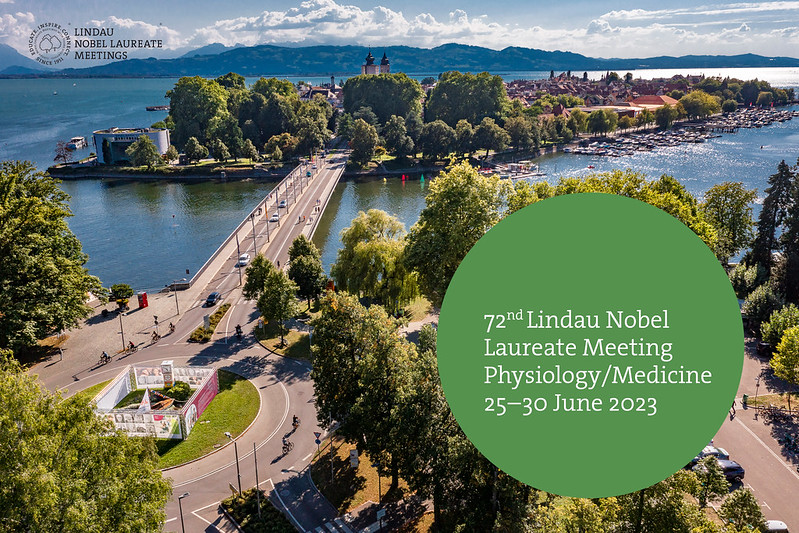I am looking for information as
Researcher

Industry

Patient

BBMRI-ERIC kicks off 10 year anniversary by supporting young scientists
This article is 938 words and is a four-minute read.
“Cells, surprisingly aesthetic and intricate machines, fine-tuned by evolution, form a basis for the function of our bodies. I enjoy being able to contribute to the discovery of these beautiful processes.” (Katerina Jurikova, young scientist)
Inspiring young scientists to utilise biobanking resources for future ground-breaking research is key to the sustainability of biobanks. As BBMRI-ERIC marks 10 years of successfully supporting the biobanking and biomolecular resources community, it is appropriate that celebrations begin by focusing on future health research excellence.
Part of this is BBMRI’s support of four young scientists to attend the Lindau Nobel Laureate Meeting – a once in a lifetime opportunity. It takes place from 25-30 June when the Bavarian lake island, Lindau at the Bodensee, will welcome 600 young scientists from all over the world.
Prof. Jens K. Habermann, BBMRI-ERIC Director General, explained:
“BBMRI-ERIC, together with our National Nodes and Biobanks, has a history of encouraging young scientists to engage with biobanking, whether it has been via specific onsite visits or Long Night of Sciences events.
Supporting these four young scientists, who already demonstrate excellent track records, is an extension of our ethos that biobanking is a vital partner for researchers. We are delighted to enable them to benefit from this 72nd Nobel Laureate Meeting to the fullest.”
About the Meeting
The 72nd Lindau Nobel Laureate Meeting is dedicated to Physiology and Medicine.
Young scientists will have the opportunity, alongside 38 Nobel Laureates, to engage in topics such as the understanding of genetic diseases and analysis for disease prediction and prevention modelling, tumour stem cells, artificial intelligence and medicine, and acquired immunity and immunological memory. Life changing research undertaken in these topics would not have been possible without donated samples, and their associated rich data, that biobanks curate.
Alongside this exciting programme are inspiring exchanges with previous Nobel Laureate winners, support for mentoring and career advice. The meeting draws to a close with several sessions on the climate crisis and its implications for health. This will ensure scientists depart with renewed, and urgent, research priorities.
Introducing the future of health research
BBMRI-ERIC is delighted to introduce the four supported young scientists who come from different countries, and share research interests, within our membership community. Quotes come from their applications – acceptance to the Lindau Nobel Laureate Meetings follows institution nomination and a stringent application process.
Angel Francisco Alvarez Prado, Ludwig Institute for Cancer Research, University of Lausanne.
Angel is currently a postdoctoral fellow and has a background in biomolecular biosciences. Angel’s research interests “revolve around cancer biology, immunology and genomics, with a particular focus on understanding the immune microenvironment of primary and metastatic brain cancers to envision new therapies against these fatal diseases.”
Read Angel’s latest paper: ‘Immunogenomic analysis of human brain metastases reveals diverse immune landscapes across genetically distinct tumors’ in Cell Reports Medicine.
Angel is motivated by “curiosity to understand how complex systems work, the thrill of the discovery, the stimulating challenges that we face to learn from nature and manipulate it to fight disease and the potential of scientific research to improve patients’ lives drive my day-to-day motivation in the lab.”
Leire Bejarano, Ludwig Institute for Cancer Research, University of Lausanne.
Leire is a currently postdoctoral fellow, has a background in biotechnology and biomedical research and has always wanted a career dedicated to science and cancer research. Leire said, “I like having the opportunity to help other people and at the same time being challenged and learning new things every day.”
Leire is interested in “identifying innovative therapies for brain tumours by targeting the tumour microenvironment, including finding new therapeutic strategies to target the tumour vasculature.”
Access Leire’s paper: ‘Therapeutic Targeting of the Tumor Microenvironment’ in Cancer Discovery to read a comprehensive analysis of the current therapies targeting the TME, a discussion of the underlying basic biology with clinical evaluation of different therapeutic approaches, and the challenges and future perspectives.
Katerina Jurikova, Department of Cellular, Computational and Integrative Biology (CIBIO) University of Trento
Katerina is a postdoctoral fellow who specialises in genomics with a particular focus on molecular genetics, non-coding RNA, phase separation, telomere biology, cancer biology.
‘Expression of Cellular and Extracellular TERRA, TERC and TERT in Hepatocellular Carcinoma’, with Katerina as co-author, was published last year in the International Journal of Molecular Sciences.
Katerina’s motivation for research comes from keen curiosity: “Biology allows us to understand how our cells work on the molecular level. Inside cells, surprisingly aesthetic and intricate machines, fine-tuned by evolution, form a basis for the function of our bodies. I enjoy being able to contribute to the discovery of these beautiful processes.”
Natalia Ochocka-Lewicka, R&D Division, Ardigan – AI in Drug Discovery – Kraków
Natalia recently completed her PhD that focused on an ‘Investigation of the brain tumour immune-microenvironment in a mouse model of glioma. Characterisation of the infiltrating immune cell populations with the single-cell sequencing methods’.
Natalia is a molecular biologist with hands-on experience in multi-omic sequencing methods: scRNA-seq, scTCR-seq, CITE-seq, ChIP-seq, and ATAC-seq with research interests focusing on “the diversity of the tumour microenvironment, especially the immune compartment, and the role of immune cells in supporting tumour growth. I am also involved in the optimisation and development of single-cell sequencing methods and bioinformatical analysis.”
You can access Natalia’s related paper: ‘Single-cell omics in dissecting immune microenvironment of malignant gliomas – challenges and perspectives’ that was published in Cells.
Follow the meeting
The full programme for the 72nd Lindau Nobel Laureate Meeting is now available and includes all the Laureate’s profiles. Follow the meeting via social media using #LINO23 from 13:30 CEST on 25th June.





